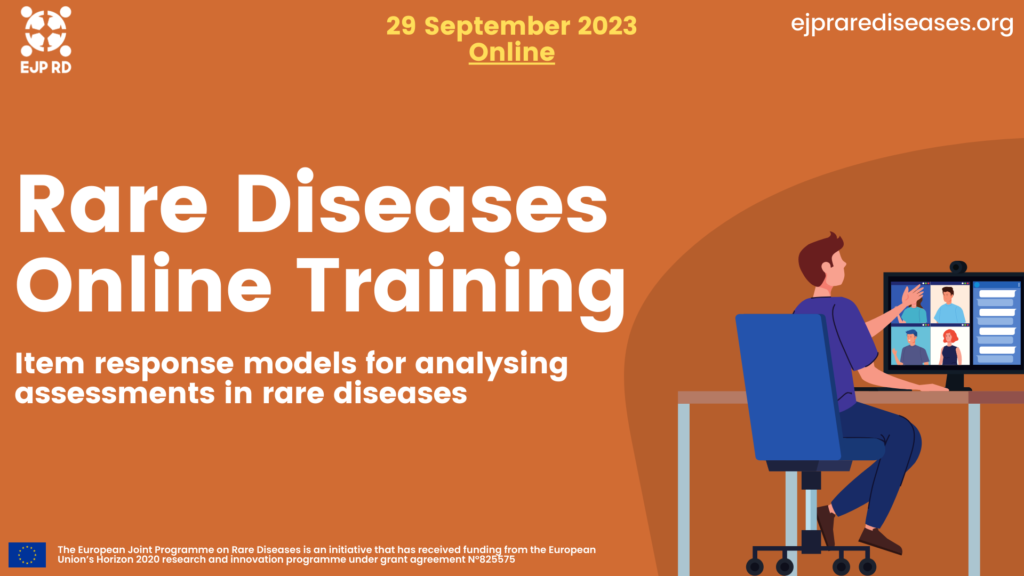
Clinical outcome assessments (COA), incorporating multiple individual items (i.e., tasks, tests, questions and ratings), are used to follow the progression of many rare diseases. The most common way of utilizing the results of such assessments is to calculate the total score and then perform inference regarding disease progression rate and treatment effects using this. An alternative strategy is to analyse all the item level data under a joint model. Commonly this is done under the Item Response Theory (IRT) concept originally developed in the psychometrics field. In IRT models, it is assumed that the different items all reflect an underlying disease severity (the US FDA use the term “reflective indicator” model in its guidance for COAs). It is therefore possible to model all item level data as dependent on a common latent variable that is allowed to change with time, treatment and other covariates. Item level data is typically categorical and IRT models have some distinct numerical advantages: (i) it treats data using the appropriate numerical assumption (total score analyses typically assume data to be continuous), (ii) IRT models naturally adhere to the bounded nature of the scale, which total score models struggle to do, (iii) it is robust to missing item level data, and, most importantly (iv) it distinguishes the differing information content between items. These properties result in higher power, or higher precision of effect size, for IRT than total score models. There are even more options for the analysis of COAs and these include (i) disease staging, (ii) time-to-deterioration, (iii) responder definitions, and (iv) individual item level response. Longitudinal IRT models representing information at the most granular level with both respect to item responses and time can be valuable tools in evaluating trial design and analysis options. Even the use of modified COAs can be assessed using such models and under different analysis models. The use of IRT models comes with assumptions and assessments of adequacy of these is a central aspect of IRT model development.
- How item response theory models are constructed based on clinical outcome assessments results
- Properties of item response theory models
- Potential usefulness of item response theory models in the development of new therapies of rare diseases
This training is at an advanced level course. While an overview will be given, without all technical details, a variety of statistical modelling and inference concepts will be used.
This training is divided in two parts:
– The first part of the webinar of about one hour, is devoted to the lecture “Item response models for analysing assessments in rare diseases” presented by Mats Karlsson.
– The second part of the webinar consists of one hour of panel discussion with known experts from different fields bringing various perspectives of the topic. This will include the regulatory, pharma-industrial, academic, and clinical perspective. In particular, questions from the audience will be answered while reflecting these different perspectives.
Mats Karlsson, PhD, FCP, FISoP 
Prof. Mats Karlsson, is Professor of Pharmacometrics at the Department of Pharmacy, Uppsala University, Uppsala, Sweden. He obtained an MSc in Pharmacy (1984) and a PhD in Pharmacokinetics (1989) from Uppsala University. After postdocs periods in the UK (Univ. of Glasgow) and US (UCSF), since 1994 he has led a research group focusing on both methodological development and application of pharmacometrics in drug development and drug usage. Therapeutic areas of interest include oncology, infectious diseases, neurodegenerative and cardiovascular diseases. The methodological focus of the group is pharmacometric model development and application, where he has coauthored several open-source software (Xpose, PsN, Pharmpy). The research group also has an educational focus with >70 PhDs graduated and >50 postdocs mentored in the group. The group gives summer schools for international PhD-students and is instrumental in a Master program for Pharmaceutical Modelling. In 2012, he cofounded the company Pharmetheus, which focuses on model-informed drug development advice to the pharmaceutical industry.
The training webinar is organized as a series of lectures presented by experts in the specific topics. Interaction between participants and lecturers will be facilitated by moderated question & answer sessions.
The workshop is open to the international research community, clinicians, medical specialists, healthcare professionals and advocacy patient groups with knowledge on the RD Clinical Trials.
The registration is mandatory here.
REGISTRATION DEADLINE: 28 September 2023 at 23:45 p.m.
The training and registration are free of charge.
The training organisers will not cover expenses incurred by the participants in any way.
At the end of the training, participants will be requested to fill an online questionnaire as feedback for learning and impact assessment.
A certificate of attendance can be requested via email to dbodden@ukaachen.de. No credits of Continuing Education in Medicine will be issued.
The language of the training webinar is English.
Online. Details for the connection will be provided the day of the webinar to registered participants.
This Training webinar is organized by Universitaetsklinikum Aachen (Germany) and Assistance Publique Hopitaux de Paris (France).
If you have questions, please contact the course organisers through this email address: dbodden@ukaachen.de and maya.dirani@ejprd-project.eu.
Please, indicate in the Subject: WP20 June training webinar
